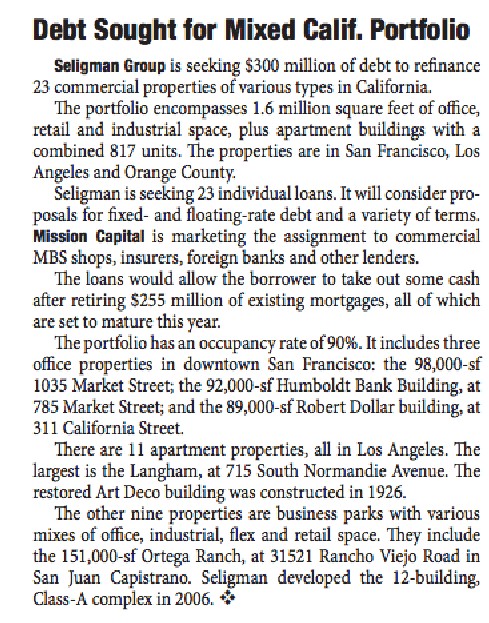40/86 Advisors is marketing six performing office loans with a total balance of $66 million. Mission Capital is handling the auction for 40/46, and investors can bid on any combination of loans.

40/86 Advisors is marketing six performing office loans with a total balance of $66 million. Mission Capital is handling the auction for 40/46, and investors can bid on any combination of loans.

Government-backed mortgage company Freddie Mac (FMCC) is selling $410 million of deeply delinquent U.S. home loans in its second sale of the debt. Buyers are bidding on three pools of loans, with unpaid principal balances of $160 million, $141 million and $109 million respectively, according to loan broker Mission Capital Advisors.

Freddie Mac Selling $410 Million of
Delinquent Home Loans
By Heather Perlberg and Clea Benson Jan 23, 2015 4:20 PM ET
Government-backed mortgage company Freddie Mac (FMCC) is selling $410 million of deeply delinquent U.S. home loans in its second sale of the debt.
Buyers are bidding on three pools of loans, with unpaid principal balances of
$160 million, $141 million and $109 million respectively, according to loan broker
Mission Capital Advisors. Offers on the debt are due Feb. 4.
Freddie Mac has been saddled with soured mortgages, bought from bonds the company guaranteed, after a wave of defaults in the housing crash. Demand for defaulted mortgages increased last year, when Freddie Mac held its first loan sale, as Wall Street firms sought to profit from rising home prices. Banks and
the Department of Housing and Urban Development were the biggest sellers of the debt.
“The loans involved in this transaction are deeply delinquent, including a large share that are more than two years delinquent,” Tom Fitzgerald, a spokesman for McLean, Virginia-based Freddie Mac, said in a telephone interview. “This transaction is consistent with Freddie Mac’s continued goal of reducing illiquid assets from its investment portfolio.”
The Federal Housing Finance Agency, which regulates Freddie Mac and Washington-based Fannie Mae, is requiring the companies to reduce the number of severely delinquent loans on their books this year.
The FHFA is working with the companies to ensure that their debt sales provide the best outcomes for Fannie Mae and Freddie Mac as well as for borrowers, said Peter Garuccio, a spokesman for the agency.
Modified Mortgages
Freddie Mac, which owns or backs $1.9 trillion of housing debt, held $161 billion of loans on Nov. 30, according to monthly disclosures. It’s also started repackaging re-performing and modified mortgages into new bonds that it guarantees.
The company sold $659 million of non-performing loans in its first transaction in July. Oak Hill Advisors LP bought the debt, two people with knowledge of the sale said in August.
Investment firms including Lone Star Funds, One William Street Capital Management LP and Ellington Management Group have been buying bad home loans as foreclosures diminish and the housing market recovers, pushing up prices of the debt.
The Freddie Mac loans sold for 76 cents on each dollar of unpaid principal balance, according to Mission Capital. That compared with average non- performing loan prices of 64.5 cents on the dollar at the end of 2013 and 49 cents at the beginning of that year.
To contact the reporter on this story: Heather Perlberg in Washington at hperlberg@bloomberg.net
Real estate money managers are investing in cities and regions they wouldn’t have considered 12 months ago, said panelists speaking at IMN’s 12th Annual Winter Forum on Real Estate Opportunity & Private Fund Investing in Laguna Beach, Calif. William David Tobin, principal at Mission, spoke on the panel.

Real estate managers, investors turning
to secondary markets — conference panel
BY ARLEEN JACOBIUS | JANUARY 23, 2015 4:19 PM | UPDATED 4:40 PM
Real estate money managers are investing in cities and regions they wouldn't have considered 12 months ago, said panelists speaking at IMN's 12th Annual Winter Forum on Real Estate Opportunity & Private Fund Investing in Laguna Beach, Calif.
Glenn R. Mueller, real estate investment strategist for real estate money manager Dividend Capital, who spoke on a panel about secondary and tertiary markets, said his firm had invested in only primary markets, but firm executives are now searching for deals in secondary markets.
“Institutional investors are starting to think about (investing in) secondary markets as well,” Mr. Mueller said.
One of Dividend’s exit strategies is to sell properties to institutional investors, and so they are searching for transactions in areas in which institutions would buy, he said.
Mission Capital Advisors, a real estate money manager, also is looking at outer edges of primary cities such as Queens in New York, said William David Tobin, principal at Mission who spoke on the same panel.
One feature that is separating the most sought-after secondary cities is whether they have a college or university and medical infrastructure, including Nashville, Tenn., and Austin, Texas, which attracts the “intelligentsia,” Mr. Tobin said.
However, both acknowledged that investors should expect lower returns and less liquidity or ability to resell the properties than in primary cities such as New York and San Francisco.
Bulk sales of residential whole loans ebbed this year but are likely to grow by 12% 32% in 2015, according to broker Mission Capital Advisors. This article was written by Debtwire, a Mergermarket company, the leading provider of real-time intelligence, analysis and data on distressed debt, leveraged finance and asset-backed markets.
![]()
![]()
Bulk sales of residential whole loans ebbed this year but are likely to grow by 12%–32% in 2015, according to broker Mission Capital Advisors.
The supply will come from HUD, commercial and regional banks, according to Mission. Rumblings are also growing louder that Fannie Mae and Freddie Mac will weigh in with significant sales of non- and re- performing loan sales, said an investor and a whole loan source.
Mission Capital, in a forecast provided exclusively to Debtwire ABS, expects bulk non-performing and re- performing loan sales will accelerate to USD 38bn–USD 45bn in 2015 after slipping about 3% to USD
34bn this year, said Luis Vergara, managing director and head of residential trading at the New York firm that also brokers commercial loans.
The additional supply will likely come from commercial banks, which have grown more comfortable with the oversight of the Consumer Financial Protection Bureau, which requires scrutiny of the counterparties in any trade, he said. Earlier this year, banks had trouble deciphering CFPB regulations, slowing the pace at which they offloaded loans, he said.
Mission’s expectations come close to the base case forecast of Compass Point Research & Trading, which calls for USD 37.7bn in annual supply through 2016, about half from commercial banks, as reported (see article, 10 December).
Access to cheap financing through warehouse lines and securitization will also encourage more bulk sales, according to the investor.
Non-performing loan securitizations have represented the fastest growth in the non-agency RMBS market. Issuance has grown to USD 12bn this year from USD 6.9bn in 2013 and USD 2.4bn in 2012, according to Deutsche Bank in a 10 December report. Along with re-performing loan securitizations, volume should be steady next year at about USD 10bn–USD 14bn, the analysts said.
Demand for NPLs has eased since mid-year, however, potentially limiting the prices that investors will want to pay for collateral in future sales. Caliber Home Loans, a frequent issuer controlled by private equity giant Lone Star Funds, paid 4% yields on the senior class of its latest NPL RMBS, a 50bps premium to bonds sold just a month earlier. Investors are concerned about thin liquidity in the deals, which could harm pricing if credit markets were upset by geopolitical events or rising interest rates.
In any event, much of the flow appears to be shifting to re-performing loans, which have grown as loan servicers complete modifications and the economy improves. Re-performing loans make up about 21% of all non-agency loans today, more than four times the share at the beginning of 2010, JPMorgan data show.
“Interestingly, sales volume composition has shifted to involve more re-performing loan trades due to![]()
enhanced pricing and capital relief relative to heavily discounted NPLs,” said Vergara, of Mission Capital.
330 Hudson Street, 4th Floor, New York, NY 10013 USA tel: +1 212 686 5277 www.debtwire.com
Re-performing loans have been about 35%–40% of supply by deal count, a trend that will continue into
2015, Vergara said.
In addition to routine sales from HUD and money center banks, Vergara expects regional banks will
reduce their holdings of “cost-prohibitive balance sheet assets” to meet stricter capital requirements.
What’s more, the GSEs will be bigger players next year, potentially adding “large volumes” to supply, the investor said. Freddie Mac completed a pilot program sale of USD 659m in August, deeming the sale well received and vowing to find more opportunities to reduce its less-liquid assets as directed by the FHFA.
The GSEs are also still understood to be considering securitizations of NPLs, a source said. Instead of selling loans outright, the GSEs could retain an interest that would allow them to share in some upside, the source added.![]()
In November 2013, Wanda DeLeo, deputy director of the FHFA’s conservator division, said the regulator was looking at ways for the GSEs to securitize some of their loans, as reported. The following May, the FHFA charged Fannie and Freddie with developing and implementing plans for “targeted” non-performing loan sales but did not mention securitization.
330 Hudson Street, 4th Floor, New York, NY 10013 USA tel: +1 212 686 5277 www.debtwire.com
Seligman Group is seeking $300 million of debt to refinance 23 commercial properties of various types in California. Mission Capital is marketing the assignment to commercial MBS shops, insurers, foreign banks and other lenders.


